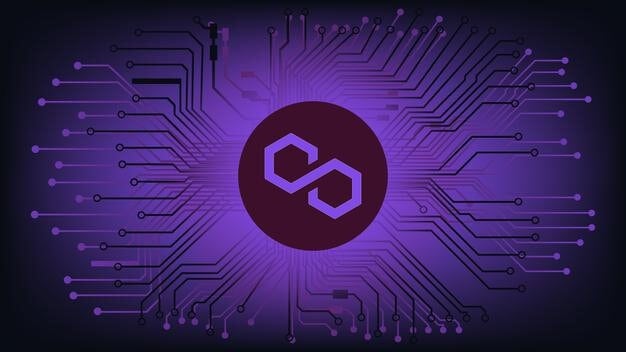As we delve into the age of digital currencies and decentralized finance, the importance of navigating this domain with the right tools cannot be overstated. Among these tools, a prominent place belongs to the combination of the Polygon network and a robust digital wallet. Together, they hold the key to unlocking the full potential of cryptocurrencies. Let’s embark on a journey to understand this fascinating world.
Understanding the Polygon Network
If you’re familiar with blockchain, you’ve likely encountered the term ‘Layer 2.’ This refers to a secondary framework or protocol built atop an existing blockchain network. These Layer 2 solutions primarily aim to rectify the base layer’s limitations, such as slow transaction processing and high transaction costs, often referred to as ‘gas fees’ in the context of Ethereum.
Polygon, previously known as Matic Network, is a remarkable Layer 2 solution purpose-built for Ethereum. Let’s illustrate this with a simple analogy. Imagine you’re driving on a traffic-congested highway, which represents Ethereum. Now, think of a dedicated express lane, which signifies Polygon. This express lane allows you to bypass the gridlocked traffic and reach your destination quicker and at a lower cost.
However, Polygon does more than merely provide an express lane. Its unique approach allows it to extend the advantages of blockchain technology further. Instead of creating a single express lane, Polygon forms a network of such lanes, enabling multiple blockchains to coexist and communicate. This heightened connectivity fosters better information exchange, leading to increased opportunities and innovation.
This versatile network serves as an efficient stage for a variety of decentralized applications, ranging from DeFi platforms to NFT marketplaces. By addressing Ethereum’s key challenges, such as excessive gas fees and prolonged block confirmation times, Polygon offers a conducive environment for the development and execution of scalable and resource-efficient applications.
Importance of a Digital Wallet
In the realm of cryptocurrencies, a digital wallet is a fundamental requirement. Similar to how you store physical currency in a conventional wallet, a digital wallet is where you secure your cryptocurrencies. However, a digital wallet goes beyond mere storage. It’s a multifunctional command center from which you can manage your digital assets.
When you hold a cryptocurrency, you essentially possess a private key – a unique data set authorizing transactions on the blockchain. This private key resides within your digital wallet. However, the capabilities of a digital wallet extend beyond this. It interfaces with various blockchains, empowering you to send and receive an array of cryptocurrencies.
Consider your digital wallet as your personal interface to the blockchain network, akin to how your email client is your interface to the email server. Just as you require an email client to send and receive emails, you need a digital wallet to send and receive cryptocurrencies.
Different digital wallets, including desktop, mobile, web, and hardware wallets, offer varying features and functionalities. The challenge lies in discerning their differences and selecting the best one to meet your specific needs. Regardless of the wallet type, the mark of an exceptional digital wallet is its ability to offer a seamless user experience, robust security features, and compatibility with different blockchains and cryptocurrencies.
Detailed Features of an Ideal Wallet
The perfect digital wallet needs to check several boxes, and these can be considered non-negotiable in today’s competitive environment:
Self-Custodial
An optimal wallet gives you complete control over your private keys. This guarantees that you alone have access to your digital assets, eliminating any need for third-party intervention. It ensures greater security and peace of mind.
Swap Feature
An integrated swap feature in a wallet provides the facility to trade one type of cryptocurrency for another. It enhances flexibility and streamlines your digital currency management, eliminating the need to rely on external exchanges for trades.
Bridge Feature
A wallet that allows bridging assets between different networks brings a whole new level of utility. It is a crucial feature for seamless transactions in the expanding DeFi landscape, where interoperability can significantly enhance efficiency.
Privacy Respect and No Data Tracking
A truly user-centric wallet respects your privacy. It does not track your personal data or share it with external parties. Given the increasing concerns about data privacy, this feature is a vital element of a digital wallet.
Gas Price Tracker
In the ever-fluctuating world of Ethereum gas prices, a built-in gas price tracker can be incredibly handy. It allows you to optimize your transactions and get the most value out of every transaction.
Hardware Wallet Support
Digital wallets that offer support for hardware wallets add an extra layer of security. Hardware wallets are physical devices that store your private keys offline, which makes them immune to online hacks.
Security
The essence of a reliable digital wallet lies in its security features. Top-notch security measures, including phishing protection, Flashbot Protect RPC, Privacy Proxy, and Token Allowance Revoke.
BlockWallet: Meeting and Exceeding Expectations
Among the plethora of options available today, BlockWallet stands out as a comprehensive tool as the Polygon Wallet. It not only meets all the essential features listed above but also surpasses them in various ways.
BlockWallet is self-custodial, ensuring that you always retain control over your private keys. It provides an integrated swap feature for streamlined trading of cryptocurrencies. It supports the bridge feature for seamless transactions across different networks. In addition, BlockWallet respects user privacy and does not engage in data tracking.
With an integrated gas price tracker, BlockWallet allows users to optimize their transactions effectively. It offers support for hardware wallets, providing an extra layer of security for your digital assets. Most importantly, BlockWallet offers exceptional security features like phishing protection, Flashbot Protect RPC, Privacy Proxy, and Token Allowance Revoke.
Deep Dive into BlockWallet’s Features
Ease of Use
BlockWallet has been designed to keep user convenience at the forefront. It presents a clean, intuitive interface that makes it easy even for crypto beginners to manage their assets.
User Interface and Experience
The visually pleasing and user-friendly interface of BlockWallet enhances the overall user experience. It not only looks good but also provides easy access to all features, making asset management simple and enjoyable.
User Support and Community
BlockWallet has a strong community and offers robust user support. Whether you need help navigating features or troubleshooting issues, the support team is always ready to assist.
Real-World Applications of BlockWallet
BlockWallet is more than just a wallet; it’s a comprehensive tool for digital asset management. It’s used by investors to manage and grow their portfolios, by developers to interact with the Polygon network, and by ordinary individuals looking for an easy entry into the world of crypto.
Conclusion
The advent of digital currencies has revolutionized the financial landscape, and having the right tools to navigate this landscape is crucial. The combination of the Polygon network and BlockWallet provides an efficient, secure, and user-friendly platform for managing digital assets. Discover more about BlockWallet and how it can revolutionize your crypto experience on the Polygon Network. With BlockWallet, you can step into the world of digital currencies with confidence and security.






